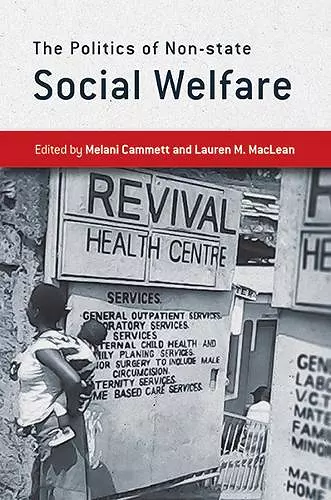The Politics of Non-state Social Welfare
Melani Cammett editor Lauren M MacLean editor
Format:Paperback
Publisher:Cornell University Press
Published:25th Jun '14
Currently unavailable, and unfortunately no date known when it will be back
This paperback is available in another edition too:
- Hardback£108.00(9780801452642)

Across the world, welfare states are under challenge—or were never developed extensively in the first place—while non-state actors increasingly provide public goods and basic welfare. In many parts of the Middle East and South Asia, sectarian organizations and political parties supply basic services to ordinary people more extensively and effectively than governments. In sub-Saharan Africa, families struggle to pay hospital fees, and nongovernmental organizations (NGOs) launch welfare programs as states cut subsidies and social programs. Likewise, in parts of Latin America, international and domestic NGOs and, increasingly, private firms are key suppliers of social welfare in both urban and rural communities. Even in the United States, where the welfare state is far more developed, secular NGOs and faith-based organizations are critical components of social safety nets. Despite official entitlements to public welfare, citizens in Russia face increasing out-of-pocket expenses as they are effectively compelled to seek social services through the private market
In The Politics of Non-State Social Welfare, a multidisciplinary group of contributors use survey data analysis, spatial analysis, in-depth interviews, and ethnographic and archival research to explore the fundamental transformation of the relationship between states and citizens. The book highlights the political consequences of the non-state provision of social welfare, including the ramifications for equitable and sustainable access to social services, accountability for citizens, and state capacity. The authors do not assume that non-state providers will surpass the performance of weak, inefficient, or sometimes corrupt states but instead offer a systematic analysis of a wide spectrum of non-state actors in a variety of contexts around the world, including sectarian political parties, faith-based organizations, community-based organizations, family networks, informal brokers, and private firms.
"The Politics of Non-state Social Welfare begins to fill a major gap in the welfare literature. Almost all of the previous literature on welfare provision in developing countries has focused on relations between citizens and the state. This book offers the first comprehensive examination of how citizens and states are affected by the growth of NGOs, sectarian organizations, informal brokers, and other types of non-state actors. The authors of the case study chapters offer in-depth accounts of such providers, drawing on extensive fieldwork. In introductory and concluding chapters, Melani Cammett and Lauren M. MacLean elaborate and assess a series of carefully nuanced propositions about variations in the inclusiveness, accountability, and sustainability of the services provided by non-state actors and the conditions in which they complement or undermine the role of the state." -- Robert Kaufman, Distinguished Professor of Political Science, Rutgers University
- Winner of Honorable Mention, Virginia Hodgkinson Research Pr.
ISBN: 9780801479281
Dimensions: 235mm x 155mm x 22mm
Weight: 454g
328 pages